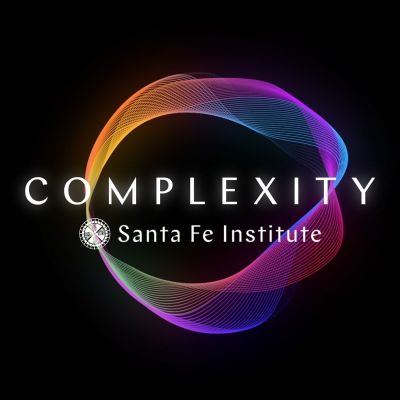Are there universal laws of life and can we find them? Is there a physics of society, of ecology, of evolution? Join us for six episodes of thought-provoking insights on the physics of life and its profound implications on our understanding of the universe. In this season of the Santa Fe Institute’s Complexity podcast’s relaunch, we talk to researchers who have been exploring these questions and more through the lens of complexity science. Subscribe now and be part of the exploration!
https://complexity.simplecast.com
Gesamtlänge aller Episoden: 4 days 12 hours 27 minutes
episode 73: Tina Eliassi-Rad on Democracies as Complex Systems
Democracy is a quintessential complex system: citizens’ decisions shape each other’s in nonlinear and often unpredictable ways; the emergent institutions exert top-down regulation on the individuals and orgs that live together in a polity; feedback loops and tipping points abound...
episode 72: Simon DeDeo on Good Explanations & Diseases of Epistemology
What makes a satisfying explanation? Understanding and prediction are two different goals at odds with one another — think fundamental physics versus artificial neural networks — and even what defines a “simple” explanation varies from one person to another. Held in a kind of ecosystemic balance, these diverse approaches to seeking knowledge keep each other honest…but the use of one kind of knowledge to the exclusion of all others leads to disastrous results...
episode 71: Lauren Klein on Data Feminism (Part 2): Tracing Linguistic Innovation
Where does cultural innovation come from? Histories often simplify the complex, shared work of creation into tales of Great Men and their visionary genius — but ideas have precedents, and moments, and it takes two different kinds of person to have and to hype them. The popularity of “influencers” past and present obscures the collaborative social processes by which ideas are born and spread...
episode 70: Lauren Klein on Data Feminism (Part 1): Surfacing Invisible Labor
When British scientist and novelist C.P. Snow described the sciences and humanities as “two cultures” in 1959, it wasn’t a statement of what could or should be, but a lament over the sorry state of western society’s fractured intellectual life. Over sixty years later the costs of this fragmentation are even more pronounced and dangerous...
episode 69: W. Brian Arthur (Part 2) on "Prim Dreams of Order vs. Messy Vitality" in Economics, Math, and Physics
Can you write a novel using only nouns? Well, maybe…but it won’t be very good, nor easy, nor will it tell a story. Verbs link events, allow for narrative, communicate becoming...
episode 68: W. Brian Arthur on Economics in Nouns and Verbs (Part 1)
What is the economy? People used to tell stories about the exchange of goods and services in terms of flows and processes — but over the last few hundred years, economic theory veered toward measuring discrete amounts of objects. Why? The change has less to do with the objective nature of economies and more to do with what tools theorists had available...
episode 67: Tyler Marghetis on Breakdowns & Breakthroughs: Critical Transitions in Jazz & Mathematics
Whether in an ecosystem, an economy, a jazz ensemble, or a lone scholar thinking through a problem, critical transitions — breakdowns and breakthroughs — appear to follow universal patterns. Creative leaps that take place in how mathematicians “think out loud” with body, chalk, and board look much like changes in the movement through “music-space” traced by groups of improvisers...
episode 66: Katherine Collins on Better Investing Through Biomimicry
We are all investors: we all make choices, all the time, about our allocation of time, calories, attention… Even our bodies, our behavior and anatomy, represent investment in specific strategies for navigating an evolving world. And yet most people treat the world of finance as if it is somehow separate from the rest of life — including people who design the tools of finance, or who come up with economic theories...
episode 65: Deborah Gordon on Ant Colonies as Distributed Computers
The popular conception of ants is that “anatomy is destiny”: an ant’s body type determines its role in the colony, for once and ever. But this is not the case; rather than forming rigid castes, ants act like a distributed computer in which tasks are re-allocated as the situation changes. “Division of labor” implies a constant “assembly line” environment, not fluid adaptation to evolving conditions...
episode 64: Reconstructing Ancient Superhighways with Stefani Crabtree and Devin White
Seventy thousand years ago, humans migrated on foot across the ancient continent of Sahul — the landmass that has since split up into Australia and New Guinea. Mapping the journeys of these ancient voyagers is no small task: previous efforts to understand prehistoric migrations relied on coarse estimates based on genomic studies or on spotty records of recovered artifacts...
